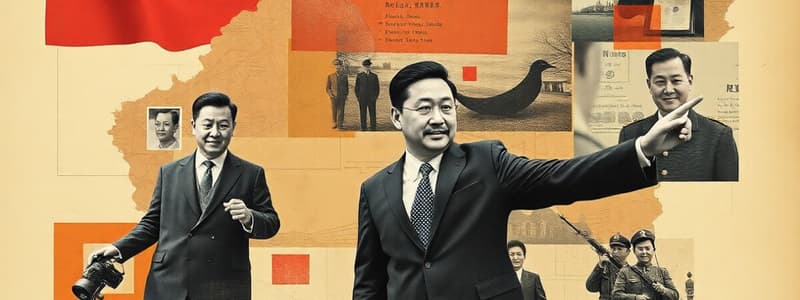Podcast
Questions and Answers
What does the concept of 'Democratic centralism' imply for the Communist Party of China (CCP)?
What does the concept of 'Democratic centralism' imply for the Communist Party of China (CCP)?
- It supports a loosely structured party system.
- It encourages regional autonomy within the party.
- It ensures strict control over the party's structure. (correct)
- It promotes open and democratic governance.
What is the 'Century of Shame' in the context of China's national psyche?
What is the 'Century of Shame' in the context of China's national psyche?
- An era marked by foreign colonization and national humiliation. (correct)
- A phase of significant territorial expansion for China.
- A time of military dominance by Chinese forces.
- A period of economic prosperity in China.
Which of the following is NOT considered one of the 'Three Evil Forces' by the CCP?
Which of the following is NOT considered one of the 'Three Evil Forces' by the CCP?
- Terrorism
- Political dissent (correct)
- Religious extremism
- Ethnic-separatism
Why is China's geography considered a factor in shaping its national interests?
Why is China's geography considered a factor in shaping its national interests?
What is the prevailing view of the CCP towards the 'Three Evil Forces'?
What is the prevailing view of the CCP towards the 'Three Evil Forces'?
What is primarily highlighted as a crucial aspect in understanding the composition of power in China?
What is primarily highlighted as a crucial aspect in understanding the composition of power in China?
How does the 'Century of Shame' influence contemporary Chinese nationalism?
How does the 'Century of Shame' influence contemporary Chinese nationalism?
Which of the following best describes the nature of the 'Three Evil Forces' as perceived by the CCP?
Which of the following best describes the nature of the 'Three Evil Forces' as perceived by the CCP?
What underlying concept informs the structure of governance within China's ruling party?
What underlying concept informs the structure of governance within China's ruling party?
In what way does China's geography impact its national interests?
In what way does China's geography impact its national interests?
Flashcards are hidden until you start studying
Study Notes
Power and Politics in China
- Power is a fundamental aspect of governance, determining the rules of the game.
- The “Century of Shame” (1840s-1949) left a deep imprint on Chinese national consciousness due to foreign domination and semi-colonization, causing enduring feelings of humiliation.
- China's vast territorial size and strategic location pose significant geopolitical challenges.
- China's geographically sensitive position, with shared borders with volatile regions and proximity to US military bases, creates geopolitical tensions.
- “Democratic centralism” is a core principle of the Chinese Communist Party (CCP), emphasizing tight control over the party structure and national governance.
- The CCP's "three evil forces" are terrorism, ethnic separatism, and religious extremism, perceived as threats to national sovereignty and regime security.
Power in China
- Power governs how any form of government operates, ultimately determining who sets the rules.
Factors Shaping China's National Interests
- Century of Shame: A period of humiliation from the 1840s to 1949, where China was subjected to foreign domination and semi-colonization. This experience deeply ingrained feelings of national humiliation in the Han Chinese national psyche.
- Victim of Geography:
- China is the world's fifth largest country by landmass.
- It shares boundaries with 14 countries, placing it in politically unstable regions like Central and East Asia.
- US military bases in South Korea, Japan, the Philippines, and Australia surround China's eastern coast.
- Democratic Dictatorship:
- The CCP's power is rooted in "Democratic Centralism."
- This concept dictates tight control within the CCP and a firm grip on China overall.
- "Three Evil Forces":
- The CCP implements a zero-tolerance policy towards "terrorism, ethnic-separatism, and religious extremism."
- These forces are seen as major threats to China's internal sovereignty and the CCP's power.
Studying That Suits You
Use AI to generate personalized quizzes and flashcards to suit your learning preferences.



